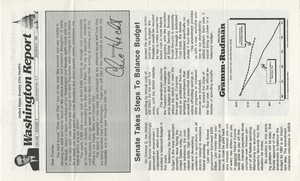Search the Special Collections and Archives Portal
Search Results

Transcript of interview with Richard Erbe by Marcela Yepes, March 19, 1978
Date
Archival Collection
Description
On March 19, 1978, Marcela Yepes interviewed Richard Erbe (born 1922 in El Monte, California) about his experiences in Las Vegas, Nevada and specifically about his career in education. Erbe first talks about his family background and German ancestry before describing how he ended up moving to Nevada. He then describes his wife’s father’s background in the gaming industry and some of the early illicit casinos that existed in California. The interview shifts to Erbe’s educational background, his first teaching position as a fifth grade teacher, his experience in the military, and his reasoning for not seeking employment in the gaming industry. The two also discuss church activity, politics, and social activities in Las Vegas. The latter part of the interview includes Erbe’s viewpoints on the issues in the educational system, his experiences as a principal at multiple Clark County schools, and some of the challenges he encountered in the administrative side in the field of education.
Text

Edith Leavitt interview, February 7, 1977: transcript
Date
Archival Collection
Description
On February 7, 1977, collector Enrico Messina interviewed Edith Leavitt (born April 12th, 1924, in St. George, Utah) at her home in Las Vegas, Nevada. In this interview, Mrs. Leavitt talks about teaching in Southern Nevada, including in the Virgin Valley and in Las Vegas. She also discusses the changing education system in Southern Nevada during her time as an educator.
Text

LeMoyne Legere interview, March 17, 1977: transcript
Date
Archival Collection
Description
On March 17, 1977, collector Cecilia Branch interviewed LeMoyne Legere (born in 1935) at her residence in Las Vegas, Nevada. In this interview, Mrs. Legere discusses various differences in Las Vegas from the time she was growing up to the date of the interview. She also discusses her involvement in high school and what people do for recreation.
Text

Magdalena Martinez oral history interview: transcript
Date
Archival Collection
Description
Oral history interview with Magdalena Martinez conducted by Monserrath Hernandez and Barbara Tabach on April 4, 2019 for the Latinx Voices of Southern Nevada Oral History Project. In this interview, Magdalena Martinez recalls her childhood and growing up in Los Angeles, California. Martinez's parents are from Durango, Mexico, and immigrated to the United States in the 1970s. Martinez describes the generational differences that the women in her family faced and how the feminist movement of the 1970s did not resonate with women of color. Her family moved to Las Vegas in 1986 where she attended Bishop Gorman High School. After transferring to the University of Nevada, Las Vegas (UNLV) from community college and joining a student organization that would later become Student Organization of Latinxs, she became an early member of the Latino Youth Leadership Conference (LYLC) sponsored by the Latin Chamber of Commerce. Martinez describes how the LYLC has evolved over the years, and talks about her role in those changes. She discusses past work for CSN, NSHE, and currently is the Director of Education Programs with the Lincy Institute.
Text

Timothy Dickhudt oral history interview: transcript
Date
Archival Collection
Description
Oral history interview with Timothy Dickhudt conducted by Barbara Tabach on March 13, 2018 for the Remembering 1 October Oral History Project. In this interview, Timothy Dickhudt discusses his move to Las Vegas, Nevada in 2017 for a fellowship at the University Medical Center in Southern Nevada (UMC). He describes the night of the October 1, 2017 mass shooting, how he was called into work almost immediately after he arrived home from his shift, and his gradual understanding that a mass shooting had occurred on the Las Vegas Strip. Dickhudt also talks about operating on a family acquaintance from his home state of Minnesota who had attended the concert.
Text

Transcript of interview with Bob Arum by Barbara Tabach, October 20, 2016
Date
Archival Collection
Description
Bob Arum is the founder and CEO of Top Rank boxing promotions company in Las Vegas, Nevada. Born in New York, Arum is a former attorney and a member of the International Boxing Hall of Fame. He promoted his first fight for Muhammad Ali in 1966 and moved Top Rank’s headquarters to Las Vegas in 1986. He has produced countless fights in the city and helped to make it “The Fight Capital of the World.” In this interview, Arum talks about the path that led him to a career in boxing promotion, from childhood in Brooklyn, New York, to education at New York University and Harvard Law School, and finally meeting Muhammad Ali while working at New York law firm. He discusses his work with Ali, as well as other boxers, including Marvin Hagler, Sugar Ray Leonard, Tommy Hearns, Roberto Durán, George Foreman, and Oscar De La Hoya, and the growth and evolution of the sport over the past forty years. In addition, Arum talks about the role of Judaism in his life, his involvement with the local Jewish community, and the importance of the Chabad movement.
Text

Transcript of interview with Helen Smith by Emily Powers, March 4, 2008
Date
Archival Collection
Description
Helen Smith, born and raised in New Jersey, came to Las Vegas in 1956. She intended to visit relatives for a couple of weeks, but ended up staying. Her aunt convinced her to interview at Southern Nevada Memorial Hospital (SNMH) and Helen worked there for a year. She recalls three hospitals at that time: SNMH, the Eighth Street Hospital, and St. Rose de Lima in Henderson. Helen worked in the emergency room back east, so it was natural for her to start in the newly opened ER at Southern Nevada. She recalls treating many victims of accidents on the "Widow Maker", or route 95 to the Test Site, and compares the more advanced treatment and staffing back east with the Las Vegas small-town conditions. In talking about the medical advances she has seen over the years, Helen gives a detailed explanation of autoclaving, describes the duties of an ER nurse, and mentions the shifts that nurses used to work. She also discusses her own progression from relief nurse to day nurse to supervisor, and comparisons are made between hospital stays 30 and 40 years ago to hospital stays today. Helen refers to doctors and nurses that she worked with or knew of, talks about the types of things children were treated for, and shares several anecdotes and stories of patients and their treatment. She also expounds further on her work history at Sunrise Hospital, with her husband in their air-conditioning business, and as case manager for SIIS in workman's compensation. As Las Vegas grew in population, a process which started in the sixties, Helen notes that more specialists were attracted to local hospitals. She shares her own more recent experience as a patient and gives her opinion on the use of ERs for general care rather than true emergencies. Her closing remarks include descriptions of changes in nurses' responsibilities and comments on her husband's work with the Children's Shrine in telemedicine.
Text

Transcript of interview with Thomas Rodriguez by Maribel Estrada Calderón, September 10, 2018
Date
Archival Collection
Description
Known for “raising hell and making a difference” in the Las Vegas Valley, Thomas Rodriguez has dedicated more than four decades of his life to the political, educational, and social advancement of the Latinx community. Tom was born in 1940 to Jennie Gomez and Joseph Rodriguez in a Topeka, Kansas neighborhood its residents called The Bottoms. Mexicans, Mexican Americans, American Indians, African Americans, among other peoples lived in this diverse and beloved community. In 1956, the Urban Renewal Program, a program funded by the Federal Government that sought to raze neighborhoods the city considered to be “slums,” forced The Bottoms’ residents to abandon their homes. Rodriguez recalled the effects that this event had on his family and on his educational career. Despite his family’s relocation, he graduated from a high school located in a nearby neighborhood in 1958. Years later, the activism and ideology of the Chicano Movement of the 1960s taught Rodriguez that to overcome the injus
Text

Patricia Vazquez interview, November 14, 2018, June 14, 2019: transcript
Date
Archival Collection
Description
Session 1: Interviewed by Marcela Rodriguez-Campo. Barbara Tabach also participates in the questioning. Session 2: Interviewed by Rodrigo Vazquez. Monserrath Hernandez also participates in the questioning. Patricia Vazquez was born and raised in Las Vegas, NV and shares her experiences growing up in the Valley as a Queer Latina. At a young age, she remembers traveling back and forth between Mexico and the U.S. to visit family. When she started school she shares how her home language, Spanish, became her family's "secret language" as she began to learn English. During elementary school Patricia was tracked into the special education program, and remove from the mainstream classroom. She would find her love for learning in books and libraries as she taught herself how to read in English. Despite being tracked into less advanced courses, Patricia would end up taking AP/ Honors courses in high school after forging her favorite teachers signature, which changed her educational trajectory. After coming out to her family, Patricia went nearly a decade distanced from her mother and continued her college education at Arizona State University. There, she would complete a bachelors in painting and a masters in comparative literature. Her work with the Chicano Studies program at ASU helped her develop her Chicana identity and begin her involvement in social activism. In Las Vegas, she worked to fight for marriage equality and LGBTQ rights with the American Civil Liberties Union , and later with the Progressive Leadership Alliance of Nevada. She also conducted several lectures for the Latino Youth Leadership Conference on sexuality, gender, and homophobia for over a decade. She has served as an English Professor at the College of Southern Nevada for the last 20 years and is an avid hiker, traveler, and painter.
Text

